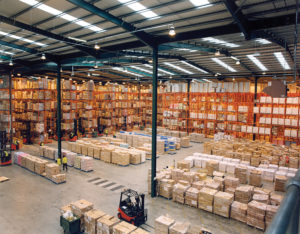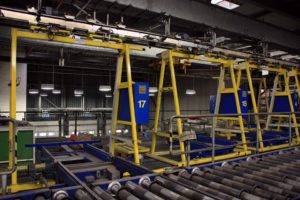Supply chain management is one of the biggest challenges faced by companies in the steel and metal fabrication industry. Tracking inventory is tough at the best of times, but with the sort of volatility we’ve witnessed over the last few years, it has become an almost insurmountable challenge for some.
The Risks of Supply Chain Issues and How to Overcome Them
In 2020, we witnessed just how destructive such practices can be. Global lockdowns shut down supply chains overnight, and even when those lockdowns relaxed and borders opened again, the increased demand meant that supplies were often stuck in a bottleneck.
To make matters worse, these issues coincided with increased consumer demand. E-commerce boomed overnight. Consumers were spending less time at work and school, and those idle hands were put to work on online marketplaces, auction sites, and e-commerce platforms. They wanted more and were willing to pay for it, but companies couldn’t get their hands on enough raw materials to supply them.
After supply chains were stitched back together, tariffs and taxes ripped them apart again and left many companies reeling.
So, how do you overcome these issues and face market volatility head-on?
Vary Your Suppliers
An efficient supply chain is one that’s adaptable, one that’s not too reliant on single sources. If you get all of your raw materials from a single factory, what happens when that factory shuts down? What if the country goes into lockdown or suddenly faces extraordinary tariffs that render your business plan unmanageable?
By working with multiple suppliers in several different regions, you can react quickly to sudden market changes.
Of course, there’s a reason that companies stick with one or two suppliers or regions, and it’s often because they’re the cheapest option. Spreading your supply might help you in the face of future market volatility, but it won’t help your profits in the short term. So, rather than splitting your supply chain equally, you can simply look into alternative options and keep them on standby.
Build an Intelligent Supply Chain
An intelligent supply chain is driven by data and focused on optimization. Some aspects of an intelligent supply chain may include:
- Inventory optimization
- Coordinated materials planning
- Predict disruptions and respond quickly
- Outsource management
- Optimization across every aspect of the supply chain
Intelligent supply chains are more robust and adaptable than traditional ones. It uses artificial intelligence (AI), machine learning (ML), and the internet of things (IoT) to mitigate risk, enhance efficiency, and help a company to prepare for any outcome.
ML and AI collate and analyze company and industry data to forecast disruptions and find workable solutions. The Internet of Things connects the whole company to a single source of information and tracks everything from material quality to employee productivity. All of these technologies are fueled by data, and in combination, they can strengthen the supply chain and ensure it’s ready for anything.
Prepare for Every Eventuality
You don’t know what’s around the corner. A couple of decades ago, the idea of global lockdowns followed by trade wars and actual wars would have seemed preposterous. These things happen, and they have happened many times before, but they didn’t seem viable in a high-tech, globally connected world.
However, they did happen, and the fallout was immense. Anticipating such eventualities won’t completely safeguard your business if and when they occur, but it will ensure that you’re better prepared.
Create action plans for catastrophic scenarios and make sure you have the necessary systems and contingency plans in place to deal with them.
You should plan for everything from a major supplier going under to pandemics, tariffs, and anything else that would greatly affect your business.
Implement ERP Solutions
Enterprise resource planning (ERP) is an all-encompassing software solution that facilitates company-wide communication and connectivity. It ensures that your business is always connected and that every department and every employee is reading from the same hymn sheet.
With cloud ERP solutions from ReelSTEEL, a company in the steel and metals fabrication sector can combine software and applications such as:
- Steel service center software
- Metals nesting software
- Plate processor software
- Human resource management
- Inventory management
- Multi-line processor software
- Cut-to-length software
- Customer relationship management
- Flat-rolled software
Demand forecasting, for instance, uses machine learning to study previous demands before comparing them to current market conditions. With this information, the software can accurately predict future demand, allowing the company to prepare accordingly.
Inventory management provides similar benefits by tracking all current, incoming, and outgoing stock. The company can track what they have, anticipate what they need, and ensure all current and future orders will be fulfilled.
Utilize the Power of Data
We’re living in the age of Big Data, so use it to your advantage.
Implementing an ERP system will give you access to key data from across your business, allowing you to optimize every department and every process. You can use this data to:
- Check the current status of raw materials, including location, condition, size, and cost.
- Pinpoint operator errors and oversights.
- Avoid under and overstocking.
- Predict supply chain interruptions.
ERP solutions can use this data to promote automation and reduce employee workload, allowing you to direct essential resources elsewhere. RealSTEEL, for instance, is built on the Microsoft Dynamics 365 platform, which allows businesses to automate key workflows and processes using various apps.
Data is tracked in real time to provide up-to-the-minute predictions.
Conclusion: Prepare for the Future with RealSTEEL
The future is uncertain, but supply chain issues don’t need to spell the end of your business. If you have prepared properly by implementing an ERP system and keeping track of all data points, you can face those challenges, adapt, and get your business back on track.
Join countless other companies in the metals fabrication sector by implementing the RealSTEEL cloud-based ERP platform. Click this link to request a demo and see the platform in action, or check out our other guides to learn how it works and what kind of benefits it provides, including ones on flexible accounting and efficient warehouse management.




